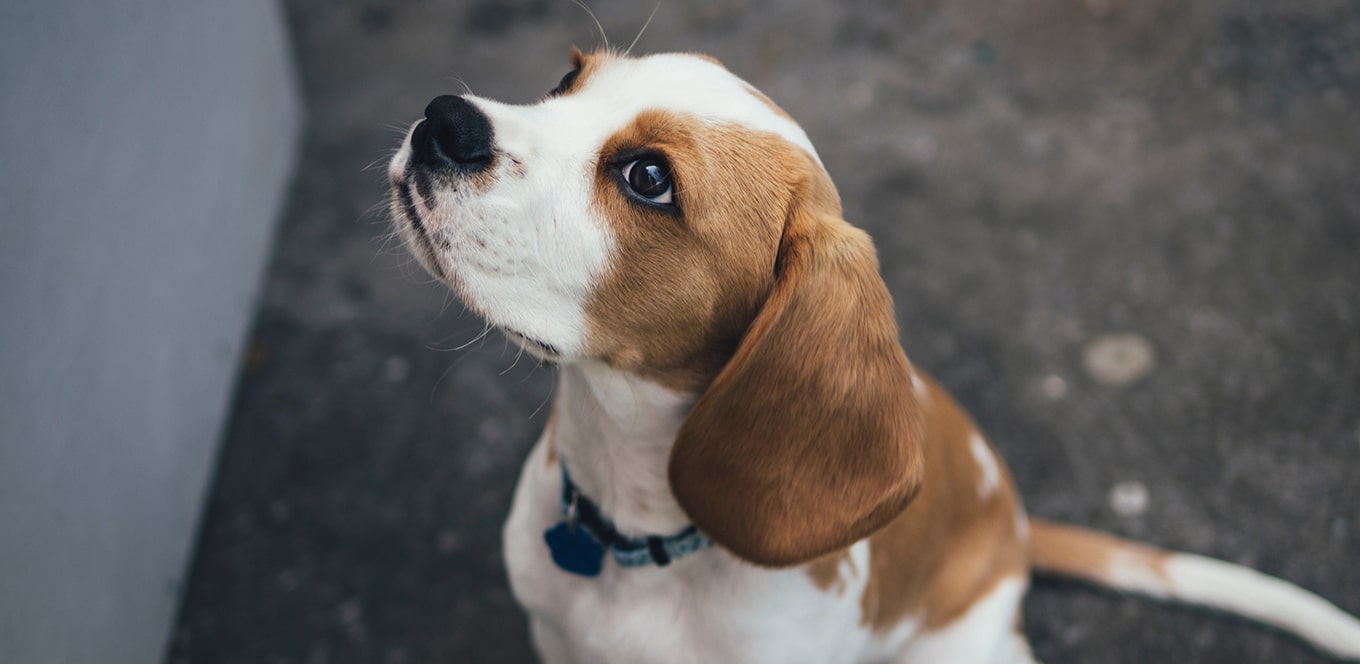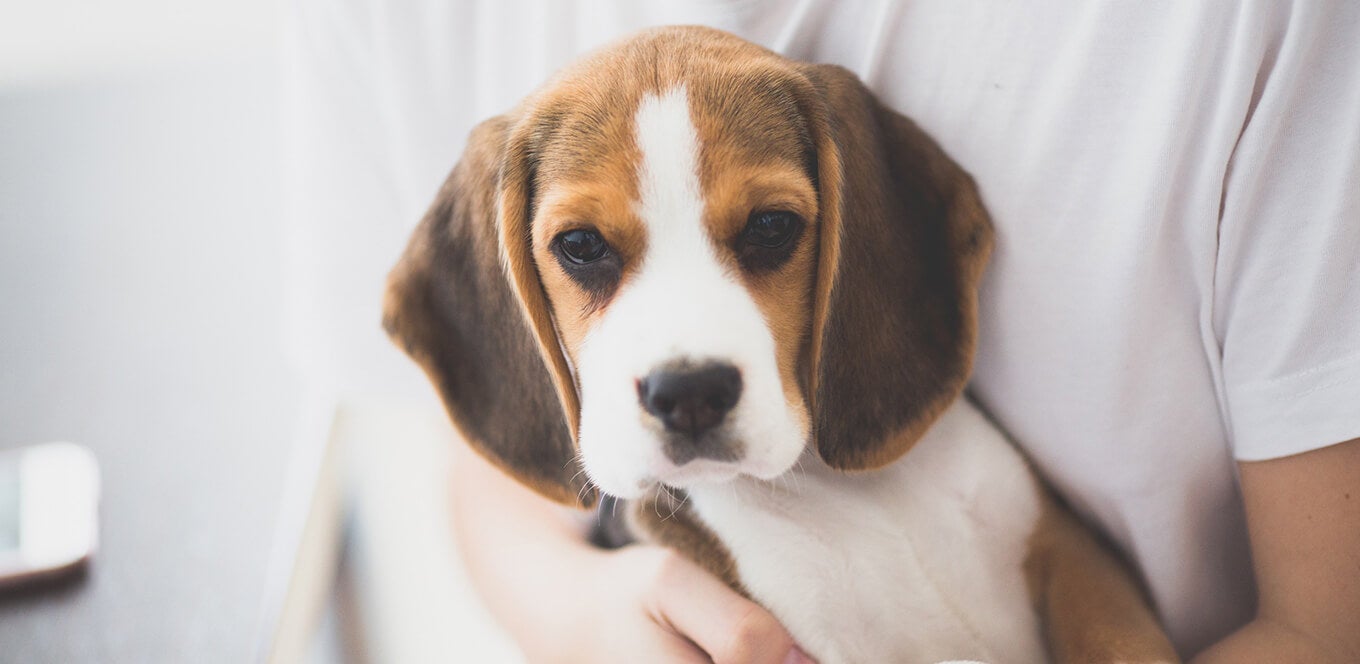
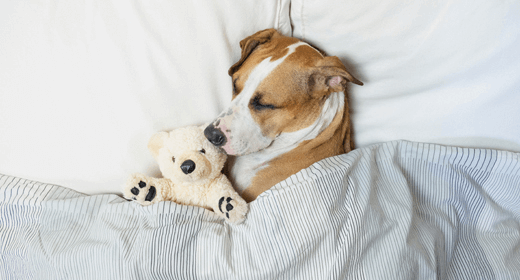
We may often envy our dogs for the kind of life they lead. Chilled, relaxed, and always well-rested. After sleeping like babies all night, dogs have the ability to nap throughout the day. You will find them basking under the sun, dozing off on the couch, or just napping next to your feet. When they do wake up after they’ve had their fat naps, they are full of energy and ready for some serious playtime.
Many animals, like dogs, sleep differently than we humans do. This is a very common reason for dog parents to wonder why my dog is always sleeping. Is my dog sleeping a lot or not enough? If you are wondering how much sleep do dogs need, there is more than one answer to this question. Just like how our sleep cycles change throughout our lives depending on our age, health, lifestyle, etc, a dog’s sleep cycle also changes depending on its age, health, and lifestyle. Keep reading to learn more about how long do dogs sleep, so it’s easier for you to understand your floof’s sleep patterns.
Dogs need a considerable amount of sleep; a lot more than we do. Additionally, carnivores like dogs sleep a lot more than herbivores since sleep is more dangerous for prey animals. The total number of hours a dog needs to sleep for varies on different factors such as its age, its health condition, and the kind of life it leads. Out of all these factors, age matters the most.
Dogs can sleep for around 12-14 hours each day, but puppies can clock in even more hours. This is because the body needs a lot of rest and repair during the first few months of life. Let’s take a look at how age affects the sleep cycle of dogs.
Puppies need to sleep for as long as their body needs to facilitate growth and repair. It is completely normal if your puppy sleeps for most of the day. In fact, puppies tend to sleep more throughout the day and less through the night.
Most adult dogs tend to sleep for anywhere between 8 to 13 hours, averaging around 11 hours each day. Yes, that’s a lot but that’s also a charm for these cute, cuddly floofs. Adult dogs tend to sleep for longer during the night depending on their and their pet parent’s schedule. However, napping for them is equally important. That being said, sleeping for a few hours during the day is absolutely normal.
Senior dogs and middle-aged dogs sleep as much as puppies. They tend to not wake up through the night and nap for a considerable number of hours throughout the day. These hours of sleep make sure that their body is well rested and recovering well as their body continues to age.
We now know that dogs, on average, can sleep for 15 hours a day irrespective of their age. However, every dog is different and will stick to a different routine which is okay. As a pet parent, you will soon understand your floof’s sleeping cycle and how its body functions.
If you do start worrying about your floof sleeping for too long, do not hesitate to contact your vet. It is always better to clear your doubts and take your furry friend to the doctor for a check-up and be sure. Another cause for concern that should be kept in mind is your dog sleeping for longer than usual. This could be a sign of underlying causes such as diabetes, dog depression, anxiety, and more. This is why a visit to the vet whenever you are worried is highly recommended.
There could be many reasons as to why your dog is sleeping so much. Our first thought is always an underlying disease that should be checked out by the vet. While this is highly recommended and also very common, many other reasons can make your dog sleep for very long.
If you’re wondering “Why is my dog always sleeping?”, the answer could be as simple as boredom. Sometimes dogs will resort to sleeping simply because they do not have anything to do. Apart from boredom, stress and anxiety are also major reasons for dogs sleeping too much. If your dog is anxious, you will notice it being lethargic and falling asleep often. The best way to combat this is to establish a routine and include some wholesome playtime.
Your dog can be susceptible to hyperglycaemia if its body is unable to produce the minimum amount of insulin needed. Certain dog breeds are at a higher risk of this disease as compared to other breeds. Visit your vet to diagnose conditions like this early and do the needful.
Viral infections in dogs are highly contagious and can affect your floof’s body greatly. Because of viral infections, your floof’s body will be unable to absorb any nutrients and will leave it dehydrated. Other than that, your floof will also suffer from a lack of protein and recovering from this disease will take some time. Resort to early puppy vaccination to keep occurrences as such at bay.
This infection caused by bacteria is highly contagious and your dog can get this disease easily through direct contact with urine from other dogs. This disease can also be passed on by humans. Again, this disease can drain your floof’s body of energy resulting in it falling asleep way too often.
Poisoning is a reason that should not be neglected by dog owners. If your dog is not trained and will eat anything palatable, it is at risk of poisoning itself. Other than that, many human foods are also poisonous to dogs. Avocados, spices, coffee, cheese, and more are foods that should not be fed to dogs, especially when you're pampering your floof.
Now that you know how much sleep do dogs need on average, you can notice any sudden changes in your dog’s sleep patterns. See a vet immediately if you suspect any illness or disease.
A dog’s sleep cycle depends on its age and lifestyle. For example, it is very normal for a puppy to sleep for around 20 hours a day since their bodies need to rest and repair.
Sometimes, dogs keep sleeping all day because they are bored. The best way to help your dogs in situations as such is to establish a routine that also includes some exciting playtime.
Judging by how much sleep do dogs need, a dog may be stressed if it is sleeping for way too long as compared to how much it should. Another sign of stress in dogs is lethargy.

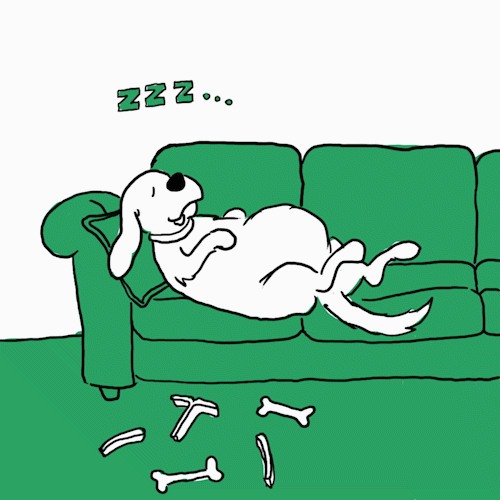

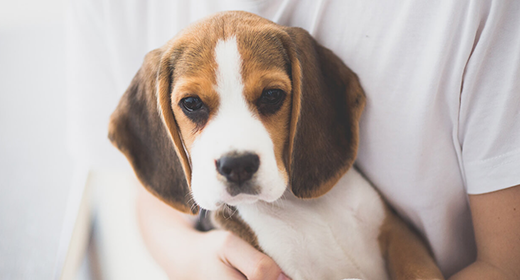
As a new puppy parent, you may feel overwhelmed by the sheer amount of information available on properly feeding your furry friend. But don't worry – we are here to help! In this blog post, we will share tips and tricks on puppy feeding, so your canine companion gets all the nourishment it needs to grow and thrive.
First and foremost, it's important to follow a consistent feeding schedule for puppies. This will help them get used to regular meals and prevent them from developing bad habits like begging for food. It's also essential to choose a high-quality puppy food formulated specifically for their age and size. Look for options containing real, wholesome ingredients and avoid anything packed with fillers or additives.
Overfeeding your puppy can lead to obesity and other health issues. It's also important to pay attention to portion sizes. And if you need help with how much to feed a puppy, feel free to ask your veterinarian for guidance.
Puppies have specific nutritional needs that change as they grow and develop. It is crucial to ensure they get the right amount of food at the right time. Our puppy feeding guide is designed to help you determine the appropriate serving size for your puppy based on age and weight. Following these guidelines ensures that your puppy gets the nutrition it needs to thrive and stay healthy.
[Puppy Feeding Chart]
Puppies are energetic and adorable little creatures, but they also require proper nutrition to grow and develop properly. So, how much should you feed a puppy?
Firstly, it's important to consider the size and breed of your puppy. Larger breeds will need more food, while smaller breeds will need less. It's also important to consider the puppy's age. Puppies under 12 weeks of age should be fed four times a day, while puppies over 12 weeks of age should be fed three times a day.
Regarding the amount of food, it's best to follow the guidelines on your puppy's food label. These guidelines are based on the puppy's weight and age and will ensure that your puppy is getting the right amount of nutrients. It's also essential to choose a high-quality puppy food developed specifically for puppies, as this will provide all the nutrients you puppy needs.
It's also important to remember that puppies have small stomachs and may need to eat smaller meals more frequently. If your puppy seems hungry between meals, you can offer them a small, healthy snack, such as a piece of cooked chicken or a small amount of carrot.
In summary, feeding your puppy the right amount of food at the correct time is important. Follow the guidelines on your puppy's food label and choose high-quality puppy food to ensure that your furry friend gets the nutrients required to grow into a healthy dog. Remember to consider your puppy's size and age, and offer small, healthy snacks as needed. Your puppy will grow into a healthy and happy dog with proper feeding.
The general rule of thumb is to switch your puppy to adult food when they reach around 80% of its expected adult size. This usually occurs when it is 12 to 18 months old, depending on the breed. Smaller breeds tend to reach adult size faster, while larger breeds may take longer.
To determine when your puppy is ready for the switch, it's important to pay attention to their body condition and weight. If your puppy is still growing rapidly and has a lot of energy, they are probably still being prepared for adult food. On the other hand, if they are starting to slowdown in growth and seem to be reaching their adult size, it's time to make the switch.
It's also a good idea to consult with your veterinarian for advice on when to switch your puppy to adult food. They can help you determine the best time based on your puppy's specific needs and growth rate.
In general, choosing high-quality adult food that is appropriate for your puppy's size and breed is imperative. Look for a formula rich in proteins, vitamins, and minerals to support their overall health and development. With careful planning and attention, you can ensure that your puppy grows into a healthy, happy adult dog.
